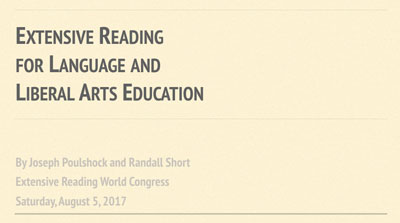By Joseph Poulshock and Randall Short
A paper presented at the Extensive Reading World Congress
Saturday, August 5, 2017
 Extensive reading (ER) fosters (a) language education with its emphasis on developing verbal intelligence in first and second languages and (b) liberal arts education with its emphasis on critical thinking and whole person education. The presenters define ER, delineate its broad educational benefits, and discuss ways to invigorate its practice.
Extensive reading (ER) fosters (a) language education with its emphasis on developing verbal intelligence in first and second languages and (b) liberal arts education with its emphasis on critical thinking and whole person education. The presenters define ER, delineate its broad educational benefits, and discuss ways to invigorate its practice.
In this age of information, with its tyranny of the digitally urgent, we may be seeing a sobering decline in enthusiasm for reading. Despite this, extensive reading remains an essential element of education for the sustenance of civil society. In fact, we can say that extensive reading energizes and perpetuates both (a) language education with its emphasis on developing verbal intelligence in first and second languages and (b) liberal arts education with its emphasis on critical thinking and the education of the whole person.
Therefore, educators need to persuade, inspire, and motivate students, fellow teachers, and educational institutions to invigorate the practice of extensive reading so that students can more fully experience its benefits.
